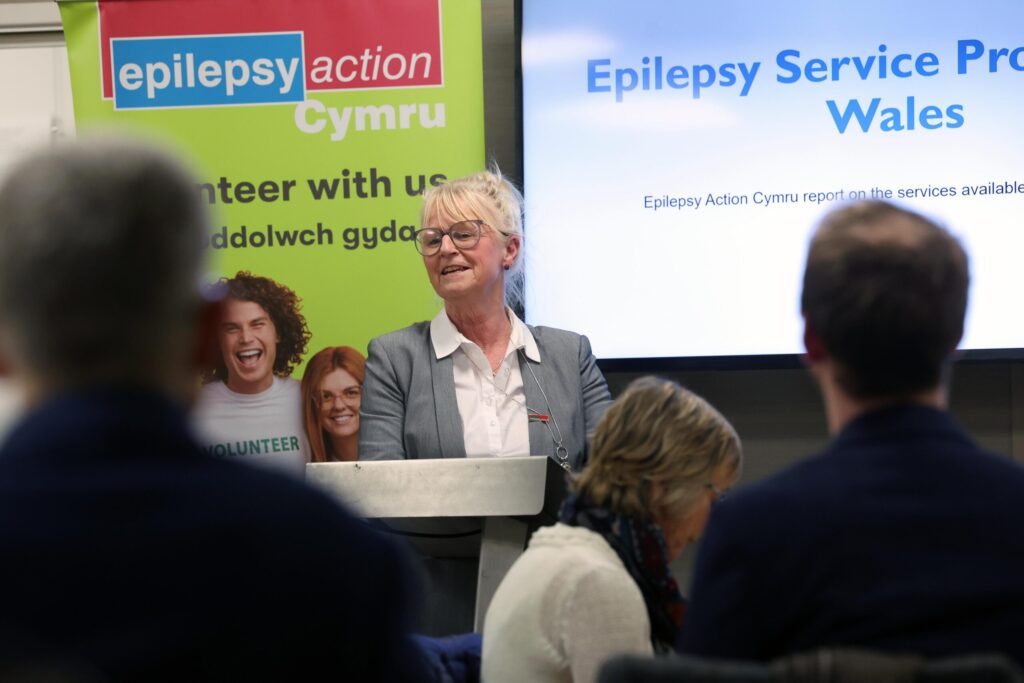Epilepsy care in Wales faces ‘woefully short’ staffing levels with less than half the number of specialist nurses required currently in post

Accessing epilepsy care in Wales has become a postcode lottery due to ongoing inconsistencies in the way neurology services are rolled out. Amid ‘woefully short’ nationwide staffing levels, some rural areas have little to no dedicated provision in place at all.
More than six months since a motion was passed in the Senedd to reduce waiting times and improve staffing levels, Epilepsy Action Cymru called another meeting with Senedd members to demand quicker action.
Members of the Senedd, clinicians and patients gathered at a meeting arranged by Epilepsy Action Cymru in Cardiff Bay this week (31 January), to discuss the challenges and urge the Welsh Government to improve on current levels of support for the more than 30,000 people with epilepsy in Wales, some of whom are having to wait a year or more to see a neurologist.
Epilepsy Action Cymru is campaigning for more Epilepsy Specialist Nurses (ESNs) to be appointed across Wales, and has introduced a new counselling service to help people living with epilepsy and their loved ones cope emotionally with the challenges they are facing.
Epilepsy patient Becci Smart, who lives in Swansea, told the gathering about difficulties she had faced in accessing transport to hospital appointments, among other things.
Becci, who was diagnosed with Juvenile Myoclonic Epilepsy at the age of 18, said: “My seizures have never been fully controlled and it has had an impact on almost every area of my life, from starting a family, to learning to drive, to finding meaningful employment. I’ve been turned down for jobs I am more than qualified to do multiple times because of my epilepsy, and not letting it stop me achieving my goals in life is a daily challenge for me.”
“My family has also been severely affected, and we’ve had some really traumatic experiences as parents to a child born with health difficulties caused by the epilepsy medication I have to take, alongside the loss of two other children as a result. The challenges I face in living life with epilepsy are as emotional as they are physical, and I cannot stress how vital providing extra support to help people with epilepsy in Wales live safer, freer lives would be.”
In response to the motion put forward by Luke Fletcher, member of the Senedd for South Wales West, and passed in the Senedd in July 2023, at the same meeting Health Minister Eluned Morgan mentioned both the Wales Seizure and Epilepsy Management Pathway, and the National Epilepsy Dashboard, as key aspects of the Welsh Government’s efforts to improve epilepsy services.
Less than one in five people with epilepsy in Wales (18%) are even aware the pathway exists, however, while 43% are not getting referred to any specialist service following a seizure, and only a third (34%) are receiving any kind of patient information following an appointment.
That’s according to new research from Epilepsy Action Cymru, which is asking for more ESNs to be recruited as a matter of urgency after it also found less than half the number of specialist nurses required to meet the needs of the population are currently being employed in almost all health board areas – and that there is no dedicated neurology service at all in Powys or Cwm Taf.
Jan Paterson, Wales manager at Epilepsy Action Cymru, said: “We appreciate that the NHS is facing a great many challenges and while it’s been encouraging to hear that the Welsh Government is taking steps to improve the availability of epilepsy services moving forward, what we’re hearing from those living with epilepsy is that things aren’t moving anywhere near as quickly as they need to be.
“A lot of people probably don’t realise that Wales has a higher rate of incidence of epilepsy than the rest of the UK, with 55 new cases per 100,000 people coming through each year compared to 37 in England. NICE guidelines meanwhile recommend a waiting time of no longer than two weeks for patients with a suspected first seizure, which are nowhere near being met by any of the seven health boards operating across Wales either.”
“We are therefore calling on the Welsh Department for Health to actively support the provision of more ESNs across Wales, alongside the widespread implementation of an ‘Epilepsy Service Co-ordinator’ task force that can support the adoption of a best practice ‘Open Access’ model currently also only put into practice by four out of the seven health boards involved, according to our research,” Jan added.
Luke Fletcher MS, who tabled his previous motion with cross-party support from 15 other Senedd Members, said: “Epilepsy Action Cymru’s research reveals a distressing reality for those managing epilepsy in Wales.
“Wales has the highest rates of incidence of epilepsy in the UK, and the extremely low specialist availability, regional discrepancies in services, and lack of investment in epilepsy resources serves only to compound the situations of those living with epilepsy in Wales.
“Historic underinvestment in epilepsy services is especially alarming when considering its prevalence in Wales compared to other UK nations.
“Waiting times for even routine appointments remain troublingly high. We cannot overlook this any longer.
“While we acknowledge that the Welsh Government are taking some positive steps to drive forward necessary improvements, things are still slow to change. Our calls to address gaps in access to services and lengthy waiting times remain. People with epilepsy must get the urgent support they need.”
Meanwhile, Epilepsy Action Cymru launched its own counselling service in May 2023 to support adults over 18 living in Wales and affected by epilepsy, including parents and carers, which offers up to eight weeks of counselling online or over the phone, completely free of charge.
For more information on this service, visit: www.epilepsy.org.uk/support-for-you/counselling-wales





